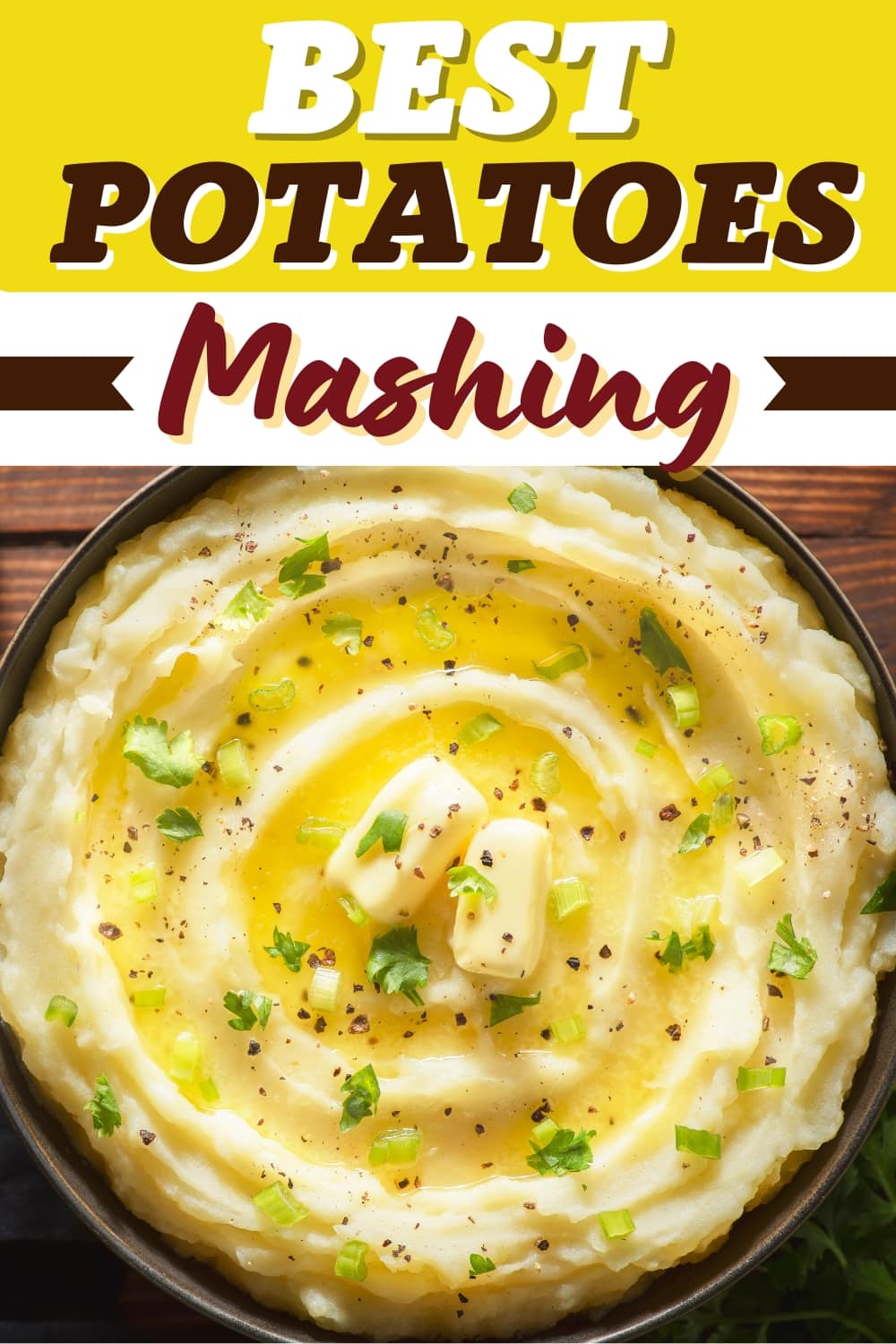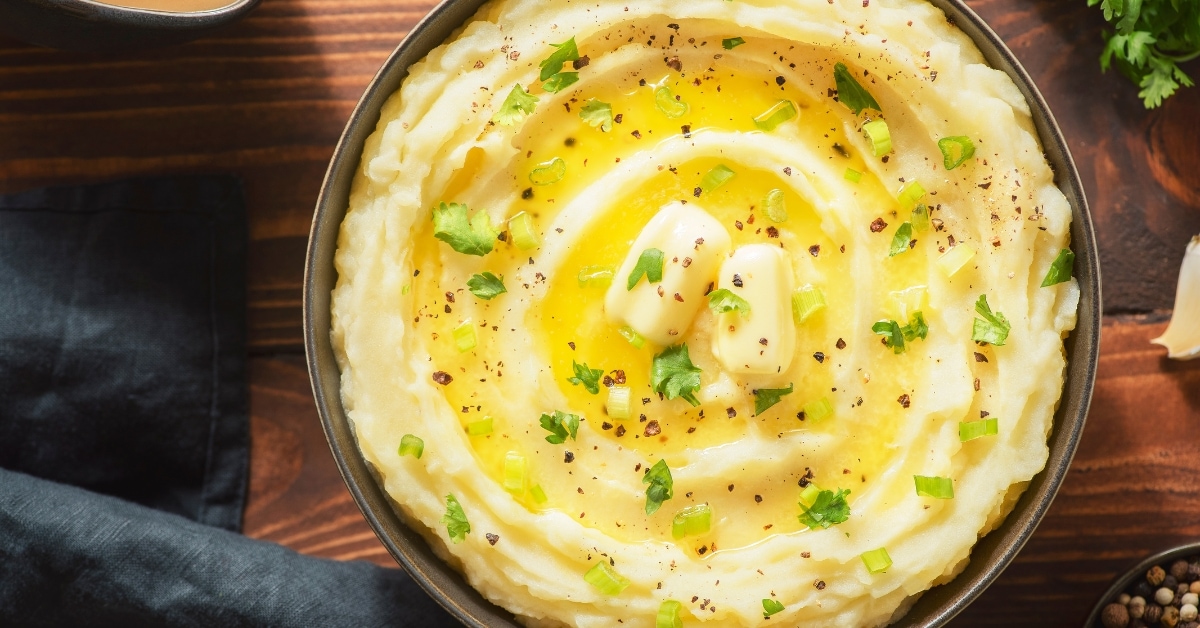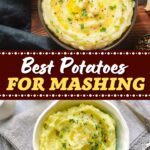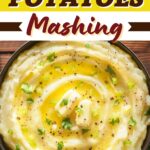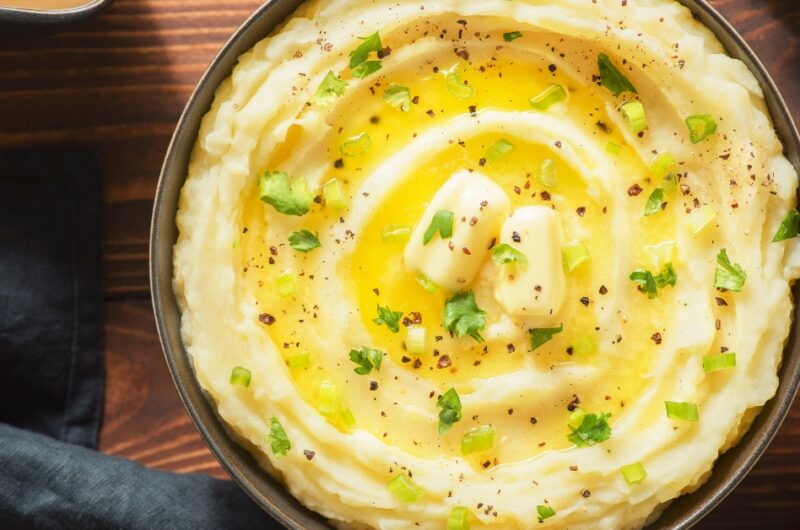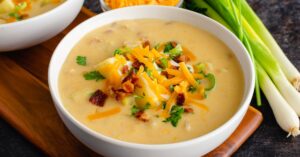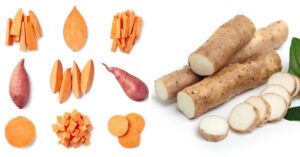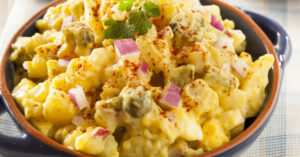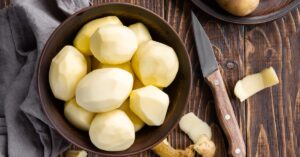Good mashed potatoes are light, fluffy, and delicately creamy. And using the best potatoes for mashing is essential.
You want a potato with a higher starch content for impossibly light and fluffy potatoes.
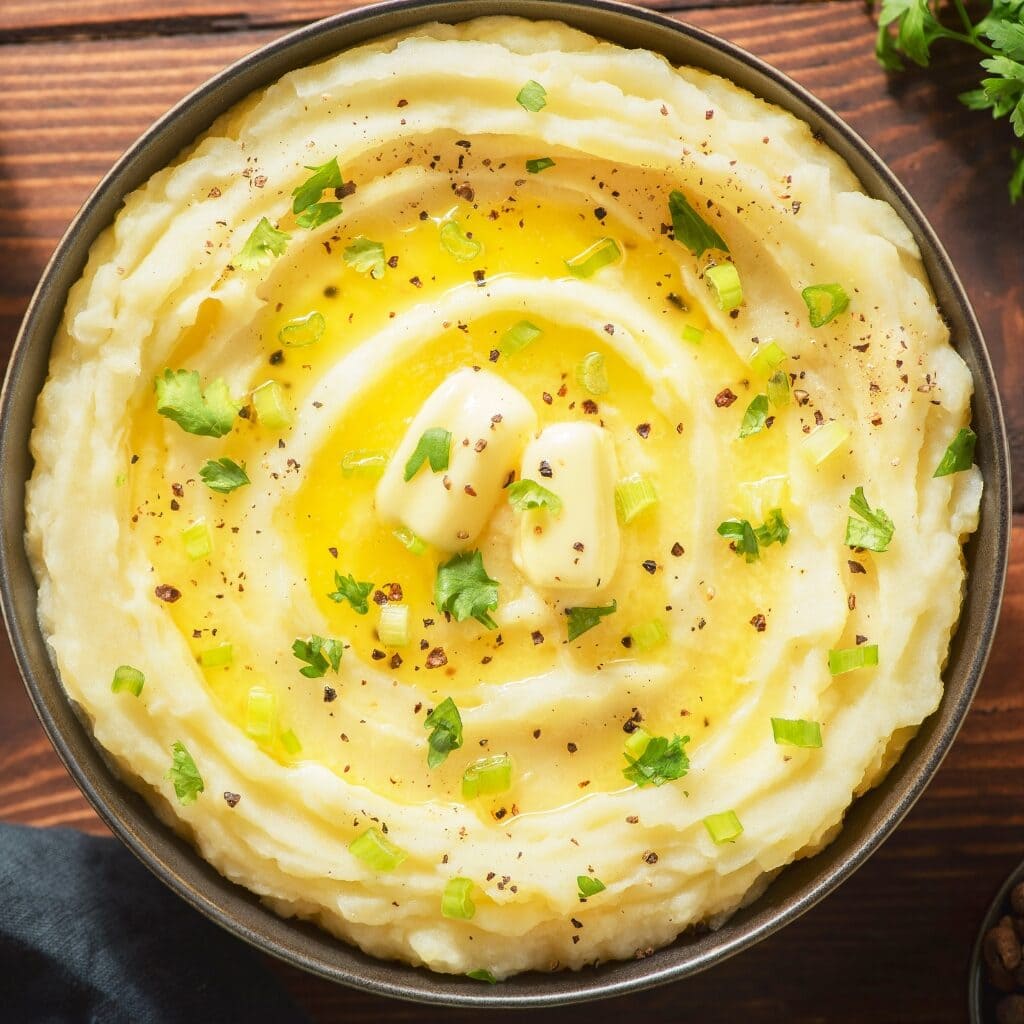
Those expensive red potatoes are great for stews or pot roast, but they make terrible mashed potatoes.
If you use the wrong type of potato, say hello to potato wallpaper paste.
Before you bust out your potato masher, check out this guide to the best potatoes for mashing.
I also list a few tips to make your mashed potato game the talk of the town.
Types of Potatoes
One of the biggest mistakes home cooks make when making mashed potatoes is opting for the wrong type of potato.
It’s important to note that not all potatoes are created equal.
There are over 200 types of potatoes just in the United States. So, let’s narrow it down a bit, shall we?
Potatoes with a higher starch content are easier to flake with a potato masher and absorb butter, salt, and cream like a dream.
Bonus points: they’re much more affordable than their waxy cousins.
Waxy potatoes have a lower starch content and don’t absorb ingredients.
You have to put a lot of work into mashing waxy potatoes, and the results are thick and gluey.
When potato shopping, steer clear of potatoes such as fingerling potatoes, red potatoes, and white potatoes.
What Are the Best Potatoes for Mashing?
Russets and Yukon Golds are two of the best potatoes for mashing.
Russets are light and pillowy, while Yukons are slightly creamy. You can use just one or a combination of both!
When in doubt, always check the starch content. They make a great mashed potato if they land high on the starch scale.
While Russets and Yukon Golds are the mashed potatoes MVPs, other types of potatoes, like Idaho and even sweet potatoes, are very starchy.
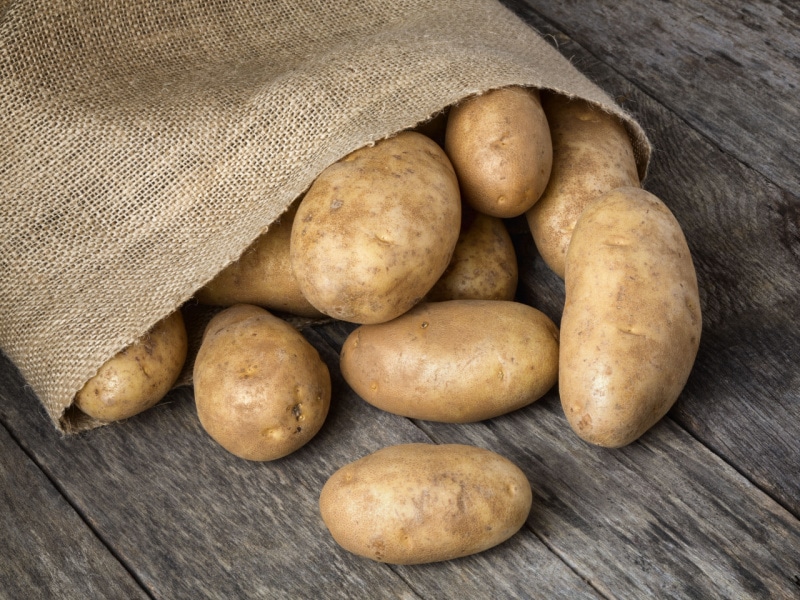
1. Russets
Russet potatoes have the highest scratch content of any potato at the supermarket. And the best part? They’re insanely affordable.
They create impossibly fluffy and pillowy soft mashed potatoes when boiled and mashed.
These potatoes have a neutral flavor profile that’s delicate and a little earthy.
They’re the perfect canvas for butter, cream, and bright seasoning.
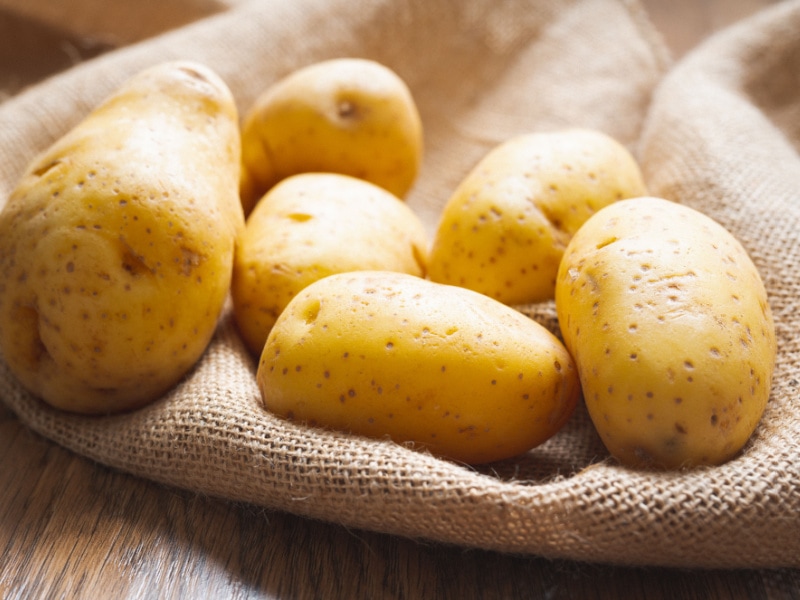
2. Yukon Golds
Yukon Gold potatoes are medium-starch and less fluffy than Russets.
They still make for excellent mashed potatoes but are slightly denser and creamy.
They have a neutral flavor, similar to Russets, with just a hint of sweetness and earthy flavors.
If you prefer mashed potatoes with a more creamy (but not wallpaper paste) consistency, Yukon Golds is the way to go.
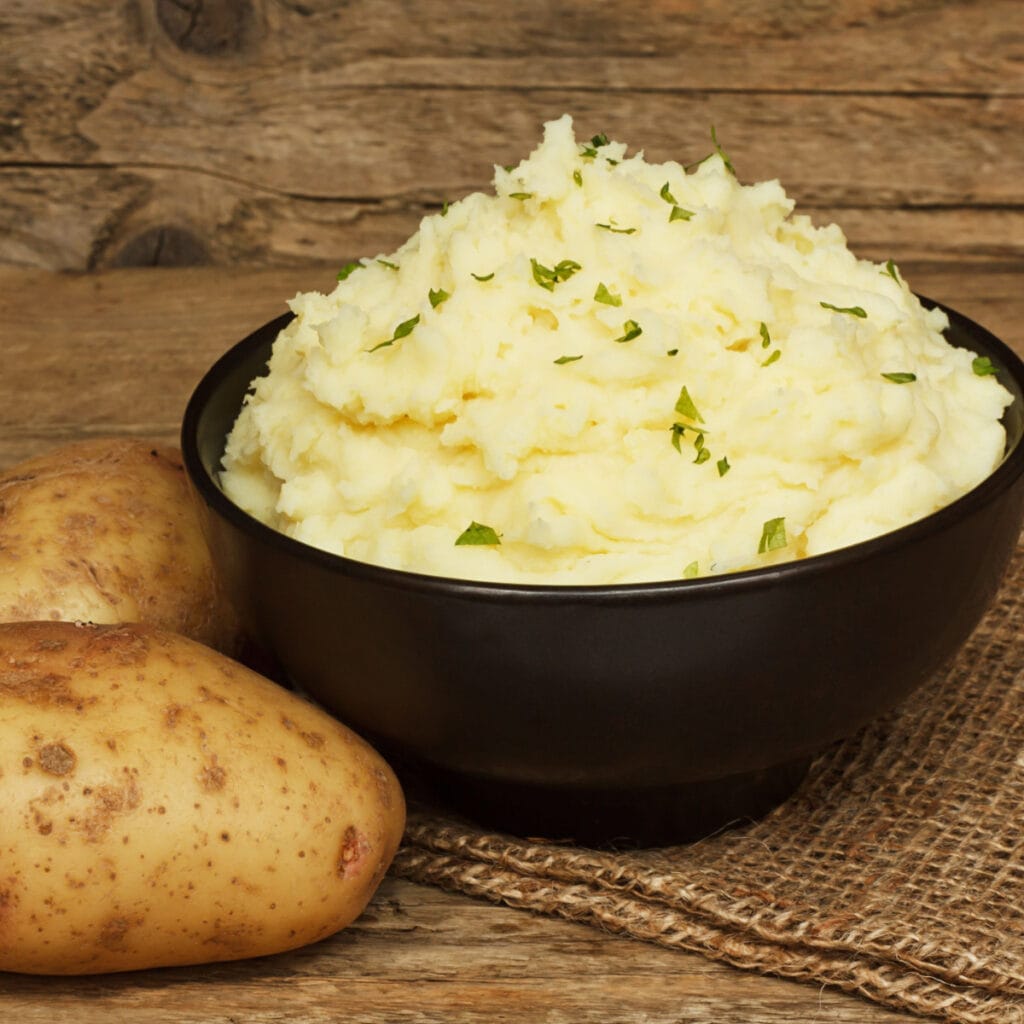
How to Make Mashed Potatoes
Stop. Step away from the stand mixer!
Everyone hates lumpy mashed potatoes, but the solution is not the stand mixer (or worse- the food processor!)
Following these simple steps is a great way to ensure that your potatoes are light, creamy, and never lumpy.
And be sure to stick around for tips to transform your good mashed potatoes into show-stopping mashed potatoes.
1. Add peeled and chopped potatoes to a cool pot of water and bring to a boil. Once boiling, cover and let cook.
2. Cook potatoes in boiling water for 15-20 minutes. The potatoes should be nice, tender, and easy to pierce with a fork.
3. Drain potatoes. Be sure you remove as much water as possible.
4. While the potatoes drain, heat your creamy ingredients. Melt the butter first, then add cream, milk, and desired spices.
5. Return potatoes to the pot and stir. Fluff the potatoes to the desired consistency using a potato masher (or a fork). Enjoy!
Tips for the Best Mashed Potatoes
Making mashed potatoes is a lot like cooking eggs. Anyone can cook an egg, but only a few can cook them well.
There’s so much that can go wrong when making mashed potatoes.
From the type of potato used to how you boil your water or add cream.
If you don’t follow these tips, your potatoes will still be good.
But if you follow these tips, your mashed potatoes will go from great to spectacular.
1. Remove as much water from your potatoes as you can. When introducing liquid to your mashed potatoes, you want it to be much more flavorful than plain old water.
Cream, butter, or chicken stock is a great way to add creaminess to your potatoes.
Water makes them creamy but doesn’t add any flavor.
And if you have too much excess water, your mashed potatoes will be soupy.
It’s excellent for potato soup but not so great when making mashed potatoes.
2. Heavily salt your boiling water. Russet and Yukon Gold potatoes are very porous and will absorb the water while boiling.
If your water is heavily salted, those starchy nuggets will absorb the salt, too.
3. Add potatoes to a cold pot of water. If you add potatoes to a boiling pot of water, they won’t cook evenly. The outsides cook much faster than the insides, producing unevenly cooked potatoes.
When you start low and slow, the outsides cook at the same rate as the insides. It’s a great way to ensure that your potatoes aren’t lumpy.
4. Never, ever, ever use a blender or stand mixer!
Potatoes are delicate creatures, and you never want to overwork them.
Popping them in a food processor makes sense to make them creamy, but it releases too much of the starch in the potatoes.
Potatoes that took a trip in the food processor are gluey and dense.
For tender, fluffy potatoes, opt for a potato masher. And if you don’t have one on hand, a fork also works!
Using a fork takes a little longer than a potato masher, but it’s worth it.
5. Add the fattiest ingredients first. The order of creamy ingredients ensures that your potatoes are impossibly creamy.
Always start with butter, and add creamy ingredients in order of consistency.
Butter is always first, then sour cream, Greek yogurt, heavy cream, and milk.
